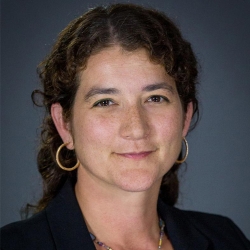
Teresa Gray
( She/Her/Hers )
Associate Professor
Speech, Language and Hearing Sciences
Phone:
(415) 338-1058
Email: teresag@sfsu.edu
Dr. Teresa Gray is an Associate Professor in the Department of Speech, Language, and Hearing Sciences. Her expertise is in the areas of aphasia, traumatic brain injury, and bilingualism. She teaches graduate level seminars on adult language communication and supervises on- and off-campus adult neurogenic clinics. Her research interests focus on bilingual aphasia, the mechanisms of language control in aphasia, and the role of language rehabilitation and its short-term and long-term effects on functional communication. Her work also explores health disparities in aphasia and how to improve treatment outcomes in BIPOC and non-English speaking populations.
For more information on Dr. Gray's research, visit her lab website: Gray Matter Lab.
Educational Background
- Ph.D., Boston University (2015)
- M.A., San Jose State University (2008)
- B.A., University of California at Santa Cruz (2000)
Certification and Licenses
- Certificate of Clinical Competence in Speech-Language Pathology, American Speech-Language-Hearing Association (2008-present)
- California State License in Speech and Language Pathology, Speech Language and Audiology Licensing Board (2008-present)
Publications (selected)
- Gray, T., Palevich, J., & Sandberg, C. (2023). Bilingual Abstract Semantic Associative Network Training (BAbSANT): A Russian–English case study. Bilingualism: Language and Cognition, 1-17. https://doi.org/10.1017/S1366728923000500
- Sandberg, C. W., Khorassani, H., Gray, T., & Dickey, M. W. (2023). Novel participant-level meta-analytic evidence for AbSANT efficacy. Frontiers in Rehabilitation Sciences, 4; 1-22. DOI 10.3389/fresc.2023.1017389
- Sandberg, C. W., Zacharewicz, M., & Gray, T. (2021). Bilingual Abstract Semantic Associative Network Training (BAbSANT): A Polish-English case study. Journal of Communication Disorders, 93, 106143. https://doi.org/10.1016/j.jcomdis.2021.106143
- Peñaloza, C., Scimeca, M., Gaona, A., Carpenter, E., Mukadam, N., Gray, T., Shamapant, S., & Kiran, S. (2021). Telerehabilitation for word retrieval deficits in bilinguals with aphasia: Effectiveness and reliability as compared to in-person language therapy. Frontiers in Neurology, Neurorehabilitation, 12, 598. https://doi.org/10.3389/fneur.2021.589330
- Gray, T. (2020). The relationship between semantic control, language control, and nonverbal control in bilingual aphasia. Behavioral Sciences, 10(10), 155. doi: 10.3390/bs10110169
- Sandberg, C., & Gray, T., (2020). Abstract Semantic Associative Network Training (AbSANT): A replication and update of an abstract word retrieval therapy program. American Journal of Speech-Language Pathology.
- Dekhtyar, M., Kiran, S., & Gray, T. (2020). Is bilingualism neuroprotective for patients with aphasia. Neurpsychologia, 139(2). doi: 10.1016/j.neuropsychologia.2020.107355
- Sandberg, C., Gray, T., & Kiran, S. (2019). Development of a Free Online Interactive Naming Therapy for Bilingual Aphasia. American Journal of Speech-Language Pathology.
- Gray, T., & Kiran, S. (2018). The effect of task complexity on linguistic and non-linguistic control mechanisms in bilingual aphasia. Bilingualism: Language and Cognition, 1-19.
- Kiran, S., & Gray, T. (2018). Chapter 10: Understanding the nature of bilingual aphasia:
- Diagnosis, assessment, and rehabilitation. In J. Rothman & L. Serratrice (Eds.), Studies in Bilingualism. John Benjamins Publishing Company.
- Gray, T. (2017). Bilingual Aphasia: An intervention roadmap and the dynamic interplay between lexical access and language control. Perspectives: Neurophysiology and Neurogenic Speech and Language Disorders.
- Gray, T., & Kiran, S. (2016). The relationship between language control and cognitive control in bilingual aphasia. Bilingualism: Language and Cognition, 19(03), 433-452.
- Kiran, S., Sandberg, C., Gray, T., Ascenso, E., & Kester, E. (2013). Rehabilitation in bilingual aphasia: Evidence for within-and between-language generalization. American Journal of Speech-Language Pathology, 22(2), S298.
- Gray, T. & Kiran, S. (2013). A theoretical account of lexical and semantic deficits in bilingual aphasia. Journal of Speech Language and Hearing Research, 56, 1314-1327.
Awards
- 2023 Distinguished Scholar Award, Tavistock Trust for Aphasia, Bedford House, Woburn, England.
- 2023 Emerging Leader Award, Boston University, Boston, MA.
- 2018 High Impact Teaching Award, Center for Equity & Excellence in Teaching & Learning (CEETL), San Francisco State University, San Francisco, CA